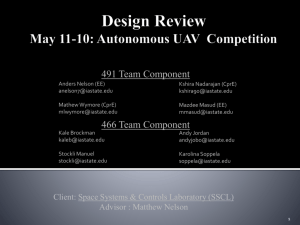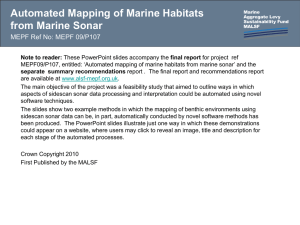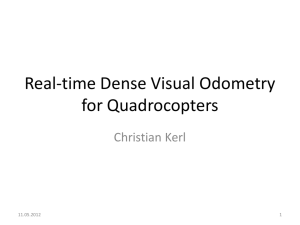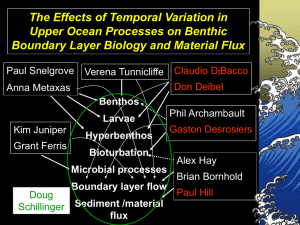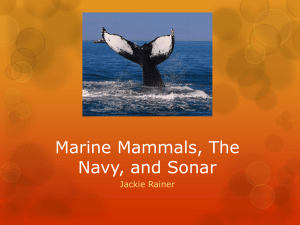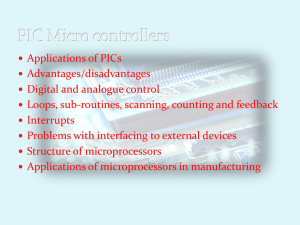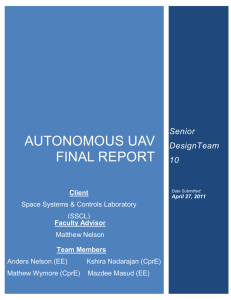pptx
advertisement
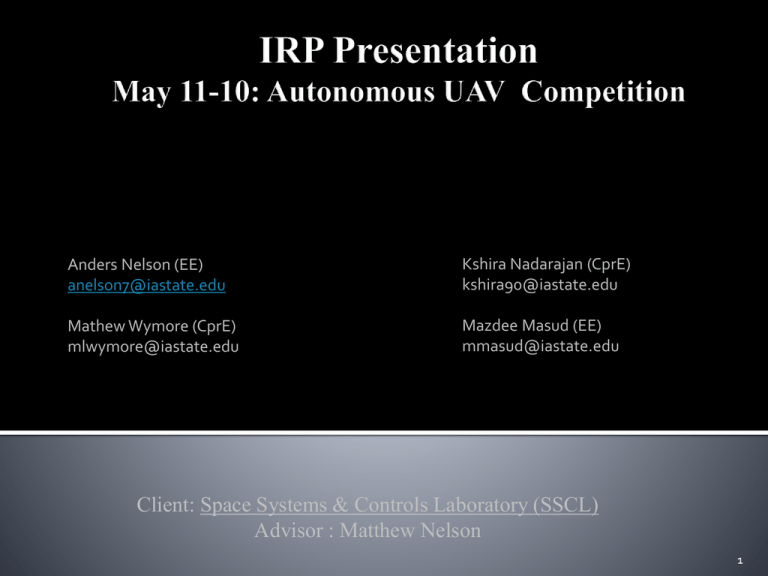
Anders Nelson (EE) anelson7@iastate.edu Kshira Nadarajan (CprE) kshira90@iastate.edu Mathew Wymore (CprE) mlwymore@iastate.edu Mazdee Masud (EE) mmasud@iastate.edu Client: Space Systems & Controls Laboratory (SSCL) Advisor : Matthew Nelson 1 SSCL(Space Systems & Controls Lab) Unmanned Aerial Vehicle AUVSI Aerial Robotics Competition 2 Aim: To participate in the International Aerial Robotics Competition(IARC) http://iarc.angel-strike.com/ Overall Challenge: To penetrate a building, navigate through the corridors and completing tasks such as replacing a USB stick ▪ Our specific challenge: To build a platform capable of flying autonomously, stabilizing and avoiding obstacles 3 1.5kg Maximum Total Platform Weight Low Power Battery Powered Capable of >10 minutes of flight time (20+ minutes reached with 1278g weight) Operational Capable of onboard stability control (Generation of PWM signals from Pic ) Wireless base station communication ▪ Wireless link capable of at least 42 meters 4 Expandable Potential for navigation in a GPS-denied environment ▪ Obstacle Detection Module using Laser Range Finder ▪ Support for computer vision system Connectivity for manual remote kill switch Potential for remote autonomous commands Connectivity for wire-burn USB stick drop-off 5 Working with 2 other teams this semester Engr 467 – Platform Team worked with last semester Engr 466 – Second Semester, Controls Team for Project Weekly team and large group meetings Team lead from Engr 467 leads group meeting and combines agendas from each team Working closely with Controls Team to set API and sensors to their requirements 6 Quad-Copter Sensors 9 DoF IMU Laser Range Finder Camera Vision System Control System Dedicated stability controller Remote Kill Switch and Manual Control Ability 7 WiFi to base station for vision processing Two separate control modules PIC dedicated to stability control Main controller for system control and communication Internal and External Sensors IMU - stability algorithms in PIC Altitude - detection through Sonar Laser Range Finder - collision avoidance and navigation Cameras – finding room and USB as part of challenge 8 Hardware System Processing Software System Software Architecture Sensors System Internal and External Power System 9 Laser Range Finder - >$2000 Hokuyo URG-4LX - 240º Obstacle Detection range : 2mm – 5m Sonar – LV-Max Sonar-EZ 4 Depth Sensing Obstacle Detection, Control System IMU – Analog ADIS 16400 9 Degrees of Freedom 12bits Resolution: +/- 300˚/s, +/-18g, +/-2.5 gauss Gumstix Overo Fire COM TI OMAP3 720 MHz w/ 256 MB RAM Angstrom embedded Linux kernel Integrated USB, WiFi PIC32MX795F512L 80MHz, 32-bit MCU 10 Larger number of teams Controls Team: Vision and Navigation Improved budget Re-evaluation of system design Arrival of some parts Communication Breakdown 11 Manually flyable platform Table-top test system Hardware Software Sensors Power 12 Gumstix SPI Ad-hoc WiFi w/ DHCP Gcc PIC Sonar PWM SPI PICstix 13 Overall system level software Obstacle Detection Module 14 15 int isLeftBlocked(); int isRightBlocked(); int isFrontBlocked(); int isBlocked(int index1, int index2); 16 Hokuyo URG-04LX Laser Range Finder Connection through software established Program developed for initializing and reading in data ▪ Sub function of forward and side obstacle detection Sonar Connects via USART serial in Consistent altitude measurements into PIC32 IMU Was not acquired, deemed a low priority ▪ Gaui 330 by Controls team used to simplify controls ▪ IMU still needed, but flight capable through stability system on Gaui Were advised to concentrate on integration of other parts 17 Lipo Battery 2 – 3cell pack combination will be used 11.1V, 6400mah, 20 C 320g BEC voltage regulator 11.1V (ESC’s, 4 motors) 3.3V (PIC) 5V (Laser, Gumstix, Camera, Sonar, IMU) 18 Motor Motor Motor Motor ESC’s Laser 11.1 V Gumstix Current Measure 11.1 V Lipo Battery 3-cell Voltage Regulator 5V Camera Sonar 3.3 V IMU PIC 19 SPI Oscilloscope, register watch, Gumstix terminal Sonar Oscilloscope, register watch Fixed position, yard stick, LEDs Power Manual flight endurance test 20 SPI PIC and Gumstix run at different voltage Sonar Sonar is accurate to 1 inch Ranges up to 44 inches Power Flight time of almost 21 minutes With 1278g weight 21 15 trials in each test case Side True Positives (%) True Negatives (%) False Positives(%) False Negatives(%) Left 100 0 14.28 85.71 Right 100 0 35.71 64.28 Front 98.4 1.6 28.571 71.42 Average 99.46 0.5 26.19 73.81 22 Implement IMU with format for use by Controls team Set up cameras with frame grabber Order designed PCB Test all connections and functions Conduct stability tests with all items on platform Implement navigation algorithm Basic algorithm designed by Controls team Test runs on complete platform Debug as needed 23 Importance of Communication Too many visions, too little time But I thought…. Full team from start Playing catch up Defining roles Attention to detail Biting off more than you can chew 24 25 26 27 28 29 30 31 First successful flight http://www.youtube.com/watch?v=SKbRr4Nj6V4 Demo of ESC shutoff at low voltage http://www.youtube.com/watch?v=Hx0s8WKSEH 8 Endurance Flight http://www.youtube.com/watch?v=jSsSbn8tQgk 32
